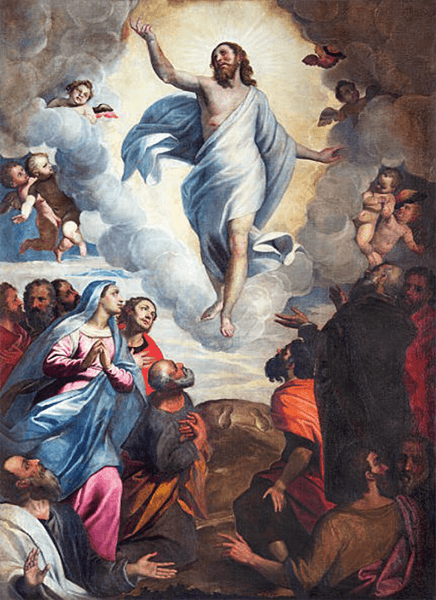?Que es la Ascensíon? / What is Ascension?
Un ascenso al cielo. La literatura bíblica y extrabíblica incluye numerosas referencias a personajes que ascendieron al cielo. En el Antiguo Testamento, personajes vivientes ascienden. Se asume que Enoc ascendió al cielo. Se le describe como alguien que ‘caminó con Dios’ y ‘dejó de existir, porque Dios se lo llevó’ (Gen. 5:24). Se describe explícitamente que Elías ascendió al cielo en un ‘carro de fuego con caballos de fuego’ (2 Re. 2:11).
La Ascensión de Jesús es la ascensión más prominente de la Biblia y se refiere a la separación definitiva de Jesús resucitado de sus seguidores. Este evento se describe en los Hechos como un ascenso al cielo tras la resurrección de Jesús (Hc. 1:9-11). Hechos presenta además la ascensión de Jesús como una exaltación a la diestra de Dios (Hc. 2:33), una alusión al Salmo 110:1 (“Siéntate a mi derecha”), y como un acto de empoderamiento mediante el cual Jesús imparte el Espíritu y es reconocido como “Señor y Mesías” (Hc. 2:33, 38).
Las referencias de Juan a la Ascensión se utilizan paraenseñar el origen celestial de Jesús y su relación especialcon Dios Padre. Él es quien descendió del cielo y luegoascendió al cielo.
Hebreos se refiere a la ascensión de Jesús en el contexto de su rol como sacerdote celestial que ascendió para entrar en el templo celestial y realizar la purificación del pecado humano (Heb. 1:3; 4:14; 6:19-20; 9:11-12).
Recibimos el poder del Espíritu a través del Bautismo y la Confirmación para ser testigos de Jesús y compartir nuestra fe con familiares, amigos y compañeros de trabajo.
An Ascent to Heaven. Biblical and extrabiblical literature include many references to figures who went up to heaven. In the Old Testament living figures ascend. Enoch is assumed to have ascended to heaven. He is described as one "who walked with God' and "was no more because God took him' (Gen. 5: 24). Elijah is explicitly described as ascending into heaven by means of a "chariot of fire and horses of fire' 2 Kgs. 2: 11).
The Ascension of Jesus is the most prominent ascension in the Bible and refers to the final departure of the Risen Jesus from his followers. This event is described in Acts as an ascent to heaven following Jesus' resurrection from the dead (Acts 1: 9-11). Acts further presents Jesus' ascension as an exaltation to the right hand of God (Acts 2: 33), an allusion to Psalm 110: 1 ("Sit at my right hand'), and as an act of empowerment by which Jesus dispenses the Spirit and is recognized as both "Lord and Messiah' (Acts 2: 33, 38).
John's references to ascension are used to teach Jesus' heavenly origin and his special relationship to God the Father. He is the one who descended from heaven and then ascended to heaven.
Hebrews refers to Jesus' ascension in the context of Jesus' role as a heavenly priest who ascended in order to enter the heavenly temple and make purification for human sin (Heb. 1:3; 4:14;6:19-20;9:11-12).
We received the power of the Spirit through Baptism and Confirmation to be witnesses of Jesus, and share our faith with family members, friends, and coworkers.
